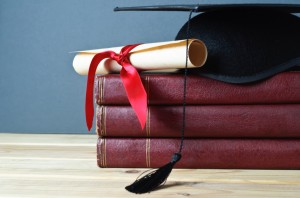Dear Graduate: Your Learning Has Just Begun
My daughter graduated last week from Wake Forest University, and even though no one asked me to give a commencement speech, here’s a message I would like to send to her and all the other 1.8 million students who have reached that proud milestone this year.
It’s just one simple message: don’t get out of the learning habit.
After four years of hard work and intensive study, it can be very tempting to put the books and tests away for good, kick back and decompress a little, and focus on the mechanics of your job (assuming you’re one of the fortunate ones who has one). But that would be a mistake.
Right now your capacity for learning is as high as it’s ever been, but that is an asset that can quickly be wasted. You have developed the habit of learning from your four years in school, and that’s a habit you don’t want to break. It’s kind of like physical conditioning; you know how hard it can be to get back into shape after you’ve let yourself go. It’s the same with learning. You know from experience that after summer vacation you need to kick-start your brain a little to get into peak mental condition for learning.
You and I both know people who brag that they never read books. Your own commencement speaker cited the statistic that 42% of college graduates never read a book after they get their diploma .As Mark Twain said, “the man who does not read has no advantage over the man who cannot read.”
What was important in Twain’s time is exponentially more important today. You need that capacity to learn because the reality is that you will probably work for a significant portion of your life in a profession that doesn’t even exist yet, probably in competition with smart people from countries whose names you would barely recognize.
Knowledge snowballs. There is a compounding effect to knowledge—the more you know, the easier it is to learn more, because you have a much more extensive network of ideas and associations that incoming information can stick to. That’s why time works in your favor; the more you learn at an early age, the faster you will learn and the more you will know as time goes on.
One of the world’s top experts on experts, K. Anders Ericcson, tells us that the majority of people in any occupation or professional field quickly reach a level of competence and then stop. Only a small percentage continue to keep learning year after year, and those gradually open a significant gap between themselves and others. Be one of those people. Never stop learning; never stop reading.
To keep the habit, set aside some time for reading and for study. Get interested in the world and read the paper. But don’t forget that you can also learn a lot from your work and daily life: pay attention, don’t be afraid to ask stupid questions, listen more than you talk, and don’t try to be the smartest person in the room. Keep a journal.
Besides the practical considerations, the drive to learn, to understand and to master, can be one of your greatest sources of satisfaction and personal motivation in the years to come. It will keep you young: Henry Ford said, “Anyone who stops learning is old, whether at twenty or eighty.” Stay curious; don’t let what you know stand in the way of all there is to learn and appreciate.



